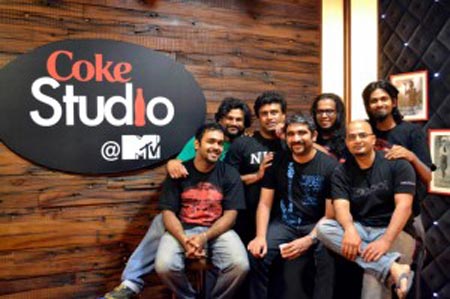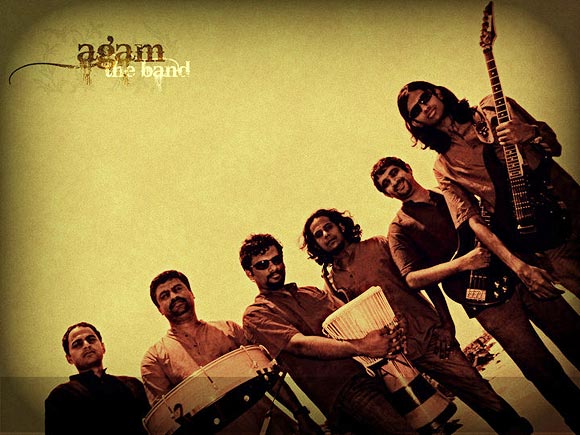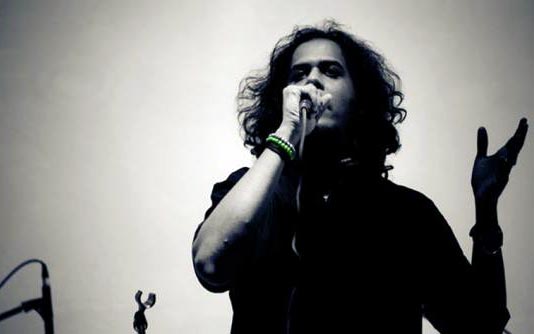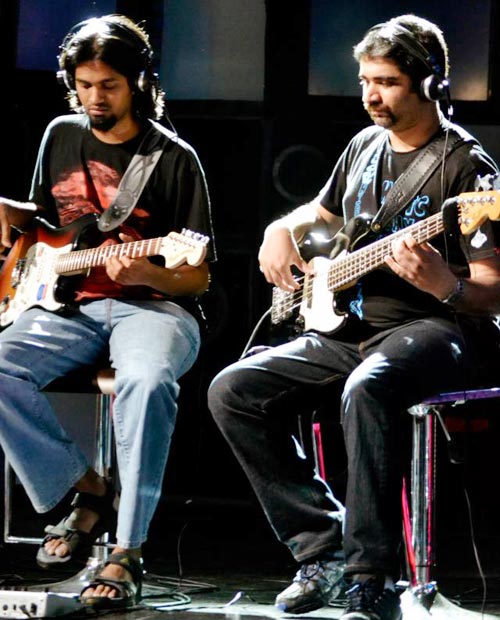Photographs: Courtesy Yourstory.in Raghu Mohan
Bangalore based band Agam is creating waves in the Carnatic Progressive Rock genre. They tell us how they came about forming a band and becoming so popular.
Agam is a Bangalore-based band of the genre Carnatic Progressive Rock.
The members of the band are BITS Pilani, NIT Trichy and Anna University alumni working for reputed companies like Adobe, AWS and Zenga.
Comprising five youngsters who are engineers by day and musicians at every other time, Agam is a very popular band in the independent music circuit.
Acclaimed by TV shows like AR Rahman's Oh lalala and compatriots like Rahul Ram from Indian Ocean, the band has recently released its debut album The Inner Self Awakens.
Furthermore, they have the distinction of having performed at MTV's Coke Studio.
The above description is only for those who haven't heard of Agam before.
I was particularly nervous about doing this interview because I am a fan myself and was really trying hard not make a fool of myself in front of them.
But what we saw during their interview was five friends who loved doing what they did and their friendly demeanor instantly put me at ease.
In a way, they were very start-up like -- save the glitz and glamour of the performing arts, they also live up to business targets and have faced similar challenges as that of a start-up.
In the studio were Harish Sivaramakrishnan on vocals, Ganesh Ram Nagarajan on drums, Vignesh Lakshminarayanan on the bass, Praveen Kumar aka TPK and Jagadish Natarajan aka Jaggi on guitar.
Apart from being treated to unplugged renditions of their popular numbers, Agam let us into the business of running a band and from our experience of interacting with start-ups and entrepreneurs, we can safely say that Agam is a top notch start-up run by able entrepreneurs in the form of exceptional musicians.

Please click NEXT to continue reading...
'We didn't even know what a band meant'
Image: The band performs frequently in Bangalore, Chennai, and Hyderabad.Photographs: Courtesy Agam, the band
When did the music bug bite you? Was being in a band something that you've always wanted to do?
I am trained in Carnatic music. But you know, in college, engineering wasn't making much sense! And back then, we used to play music to overcome our inabilities to perform well in tests.
Harish and Ganesh used to play together and Vignesh used to play with us every now and then. We didn't even know what a band meant for the longest time!
It was just jamming at college. We had a collective passion for music, but we don't think we wanted to be in a band per se.
So how did Agam come to be? What was the moment reckoning when you realised that you want to do this more seriously?
Back in 2007, we had auditioned for a band hunt competition for Sun TV which we did so that we could get our hands on some good equipment!
And at the time that we're talking about, bands that played their own music were very few in number. For us as a band this was the first time we had come together for something serious, because until then we were doing anything that came by to us.
We had composed a song and hadn't even recorded it. We were playing it for the first time at the auditions together, and somehow it clicked.
Many people came up to us saying, 'Hey, that was nice' and they weren't saying that to a lot of people who we thought were brilliant. That's when we thought maybe there is more to what we're doing.
'People engaging in piracy were on a moral high ground'
Image: Lead vocalist Harish Sivaramakrishnan is a trained carnatic musician and also plays the violin.Photographs: Courtesy Agam, the band
What are some of your learnings from being in this industry? Is it a lucrative business to be in?
As a band, you cannot be a perpetual beta. You have to put out your work for sale. We had to make that decision: this is Agam 1.0 and it is going to cost you this much.
People not buying is another thing, but you have got to let the world know that you're not doing this for charity.
And NO, it is not a lucrative business to be in. We don't want to name them, but there are about five bands in India who're making good money from the music that they create.
On the other hand, cover bands make pretty good money. The difference is similar to what you expect from a product company and a services company. The entry barrier is much lower for a cover band than it is for a band that plays its own music.
Is the music industry in India changing? If so, is it for the better or the worse?
Things are changing for the better. Until four years ago, there was a crisis of intent. People didn't have the intention to buy music at all. Now that intent has arrived. If there's enough value in what we're selling, the intent translates to action.
This is mainly because of dishonest selling of music. People were selling expensive stuff with very little value and with the advent of technology, piracy ensued.
In fact, the people engaging in piracy were on a moral high ground because they could look at an artist and say 'You're a rip off! So I'm giving it back to you!' But this has changed now and there's more honest music out there.
Also, technology has helped a lot. Stuff like YouTube and SoundCloud is a big deal! With these distribution systems, bands can build trust with their listeners and the listeners will buy their goods based on that trust.
Agam has a good social media following. What is the secret to your social media strategy?
We all maintain the social media account. How we went about building it was pretty old school. Our first gig in Bangalore was in this joint called Kyra. We used to hang out a lot there and we kept pestering the owner to give us a gig, which he finally did.
So we basically called and emailed about 1000 people saying 'Hey, our first ever live performance is going to be at Kyra and it will cost Rs 150 for the ticket.'
Of the 1,000 we reached, about 200 turned up and we performed pretty well. At the end of the concert, we asked them to drop their email IDs at the entrance.
We contacted the same people when we played at next events and started having this online engagement with the guys who come to our concerts.
It was mainly all about coaxing people to come online and visit our Facebook page, where we made an effort to post useful stuff. So our concerts became the meeting ground to interact with guys that eventually made up our social media following.
Then bigger gigs happened. We performed at StormFest, which was huge. We then performed at MADfest, which was again huge and then we performed at the baap of all of these concerts -- MTV's Coke Studio.
We still remember Rahul Ram from Indian Ocean after StormFest telling us on live TV: You guys were awesome!
When these kind of things happen, people search for you and that accelerated the growth of our social media following.
Having said all this, we don't consider ourselves to be social media gurus and most social media experts out there will call our strategies old and inefficient, but that's what we did, and it's worked for us.
'You can't make good music if you are in a bad state of mind'
Image: Guitarists Praveen Kumar and Vignesh Lakshminarayanan feature a performance on MTV Coke StudioPhotographs: Courtesy Agam, the band
What are the goals and targets that a band lives upto? What is it specifically for Agam?
The goals of a band change as it evolves. First, you need to come up with your own music. Once you've done that, you must look for gigs to perform at. Then write more songs so that you can do bigger, independent gigs and so on. For Agam specifically, we are now in a space where we aim to do at least three paid gigs a year.
These targets are very important because by meeting these targets, a band sustains itself financially. And music being the state of mind thing that it is, having financial problems will affect your music. You can't make good music if you are in a bad state of mind.
So is bad finances the band killer?
It can be. But the biggest band killer is disagreement and badly managed egos. Most of the time, bands break up because they don't want to work with each other anymore.
How have you managed this band killer at Agam?
We're all just very good friends. Having studied in the same college and playing music for the same club, we really know each other pretty well. We know how to leverage each other's strengths. We also have great respect for each other as musicians and we're very tolerant, we won't hold a screw up against someone.
Does the business aspect of a band affect the music?
Yes it does. We have day jobs and we have time in the evening to make music. In that time, if we have to negotiate with the taxi driver or co-ordinate with an event organiser, it leaves us with lesser time to make music.
This is when a manager comes into play. This person would ideally take care of all of these things so that artists can do what they're meant to. As far as Agam is concerned, we would like to have a manager, but we don't know how it will work as of now.
What advice would you like to give to budding musicians?
First and foremost is perseverance. You must have a vision for what you want to do musically. Once you've made music, wet it! You need to have a feel of what the audience thinks about your music, if you think otherwise, you are better off playing in your garage.
As a band, you have to stick together. A band is for everyone in it and not only you. Make money at all opportunities and most importantly, make your music commercially viable.
All good things have to come to an end and so did our time with Agam. Personally, we had a great time interviewing them and the insights that they shared with us made us realise that the business aspect of showbiz is not very different from that of an start-ups where all entrepreneurs are rockstars!





Comment
article